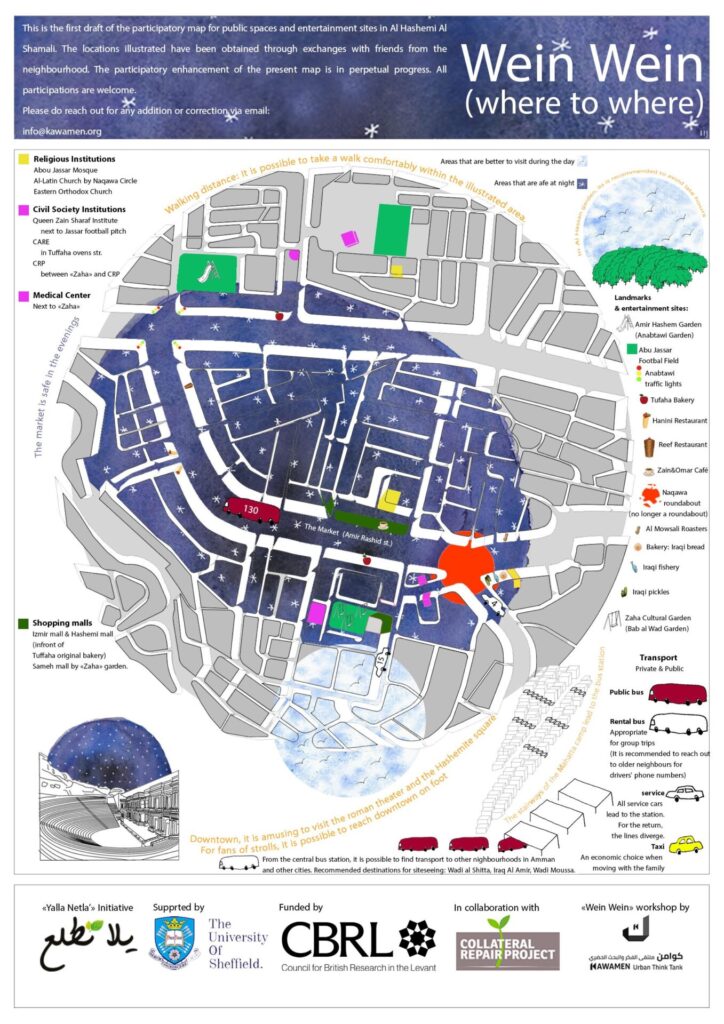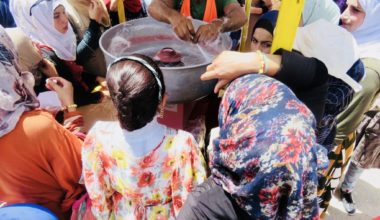By Hala Ghanem, The Hashemite University

Cities in the Levant are witnessing increasingly large shifts in population due to forced migration. Jordan, a country surrounded by conflict, is the second largest refugee host in the world, impacting Amman, the capital city, both socially and spatially. This dynamic is not entirely new; the city’s diverse population was formed by displacement and refugee movements beginning in the 1870s, with each wave of urban newcomers increasing the pressure on municipal services and thereby creating a distinctive challenge for social cohesion.
The rapid increase in population has contributed to the increase of local tensions, particularly from host communities. These tensions include racism, verbal and physical attack, hostility and disrespectful treatment. As major spatial components of the city, Public Open Spaces (POS) play a vital role in social lives and are key contact spaces for refugees and locals in urban settings. Despite being essential for social cohesion, POS are often ignored in debates about refugee integration in Amman. While international agendas and local authorities tend to focus on camp refugees, less attention is afforded to refugees living in cities. By not prioritising long-term solutions and perceiving refugees in cities as temporary obstacles, local policies undervalue the social component of emerging multicultural communities. Overcoming these challenges begins with promoting POS as an effective tool in supporting the well-being and integration of refugees living in cities.
Yalla’ Netlaa’ Project, translating as the “let’s go out” project, aims to highlight the potential of everyday neighbourhood POS as venues of integration and as sites of representation of the multicultural nature of Amman. The project is an extension to a local intervention that took place in Amman during the summer of 2019 as part of my PhD fieldwork and in collaboration with a local non-government organisation (NGO), the Collateral Repair Project (CRP).
The fieldwork involved ethnographic excursions with refugees from different ethnic backgrounds, age groups, religions and genders. These excursions facilitated an in-depth understanding of refugees’ everyday outdoor experiences in the Hashemi Shamali neighbourhood in Amman by exploring the ways by which refugees perceive and value POS and identifying the challenges they face while outdoors. The project, which notably relied on partnerships, consisted of a series of collaborative clusters of workshops and outdoor interventions in Amman, most of which seek to simultaneously achieve collective investigation, education and action. When examining research as intervention more than just means of data collection, the methods were designed to: first, value refugees as full collaborators with valuable local knowledge; and secondly, to include experts who can provide support, add status to the project, and accordingly draw in external organisations.
One main goal of this project was to include refugees in participation and leadership for social cohesion and access to public spaces, notably through workshops that were designed to raise awareness concerning the purpose of public spaces, as well as by co-identifying challenges that refugees face in the outdoors in mind of finding potential solutions through building on their local knowledge.
The outdoor interventions were co-planned with refugees during the workshops and aimed to generate a culture of using public spaces among refugees by encouraging a variety of outdoor activities to build familiarity with POS, normalise multi-ethnic presence and activities in POS, improve women’s access, and provide more outdoor opportunities for them.

Furthermore, the project prioritised the consideration of actors involved in the process and worked to provide neutral spaces between actors who rarely meet to facilitate knowledge exchange and deliver different perspectives to build communal respect between each other, as well as between them and participating refugees. Refugees’ mobility in Hashemi Shamali was of concern to this project. Hence, a collaboration with Kawamen (an urban think tank) was formed to conduct workshops that focus on access to neighbourhood public spaces.
The workshops were named: Let’s Talk (see Figure 1), Let’s Collaborate, Let’s Communicate, and Where to Where? (see Figure 2). Each had a dedicated set of objectives and encouraged multiple ways of expressions to facilitate the elaboration of ideal outdoor experiences and familiarise public space discussions. Methods included drawing collages, creative writing, storytelling, basic cartography, and gathering materials from nature.

Some workshops aimed to create a venue for knowledge exchange and tried to plant seeds of collaboration between partners who represented different parties: The Greater Amman Municipality, University of Sheffield, University of Cumbria, UN-Habitat Jordan, Collateral Repair Project (CRP), and The Jordanian Hashemite Fund for Human Development (JOHUD). Emerging themes of discussion were POS access mechanisms, collaboration between partners, and participatory approaches.
At the end of the workshops, a plan of three outdoor trips was made. We began from a neighbourhood park as a known base to build familiarity about what is offered and how to get there. We then shifted to other city spaces: a designated public park and a natural outdoor area.

Celebrating the end of the project, all participants and members from the local community gathered at CRP’s outdoor garden, where we had a final exhibition showcasing photos from the project’s workshops and outdoor experiences (See Figure 5).

The sustainability of the project was studied, and another set of workshops planned to revisit findings and work on developing a mobility prototype and map.
As a learning process for all, this project was one way to examine research as intervention and a continuous belief of the significance of multi-actor collaboration, knowledge exchange and the value of local knowledge.
I would like to thank CBRL for this opportunity, and I hope to see more similar projects that balance investigation and data collection with collective education and intervention.
About the author
Dr Hala Ghanem is an assistant professor in the Architectural Engineering Department at The Hashemite University, and affiliate researcher in the Landscape Department at the University of Sheffield. Hala is a spatial planner interested in researching relational perspectives of public open spaces, migration, refugee studies, and post-conflict cities. She is the recipient of a CBRL Research Project Grant 2021-2022.
The views expressed by our authors on the CBRL blog are not necessarily endorsed by CBRL but are commended as contributing to public debate.














